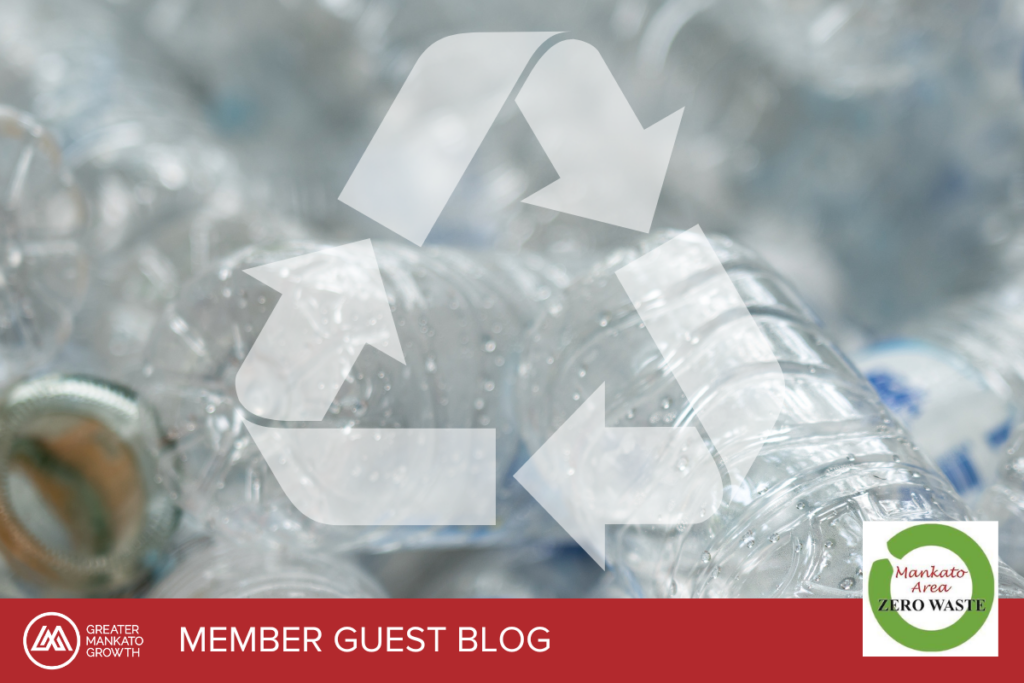Blog written by Mankato Zero Waste, a Greater Mankato Growth member.
Replacing bottled water with a bottle refillable drinking fountain not only is good for the environment, it is something your employees will love you for. Just ask Joe Bohrer, customer account manager at Ameristar. who had a bottle filler drinking fountain installed recently. To mark the occasion, Joe purchased 50 – 26oz reusable metal bottles to be given to each employee. The employees love the water dispenser vs the old drinking fountain – usage is up 1000%. Not having to collect and process all those plastic bottles saves money. Cities that provide free refillable drinking fountains to citizens and tourists notice a significant reduction in plastic waste.
Why is this so important for our planet? Bottled water is plastic PET #1 which is made to be used once and thrown away. Can you imagine anything more absurd than that? We make something to be thrown away immediately after one use that causes unbelievable harm to our planet. According to the Container Recycling Institute, about 46 plastic bottles are sold in Minnesota every second, with 2760 every minute and nearly 1.5 billion plastic bottles a year. (nationally 35 billion empty water bottles a year). “About 75% percent of those bottles are carelessly thrown away,” as stated by the MPCA.
They are the single biggest contaminate of our water ways. They do not break down completely but break down into smaller pieces called microplastics (the size of a rice grain) and then nanoplastics (1/8 the size of a blood cell). Marine animals ingest these microplastics and die from starvation because they interfere with animals’ digestion. Plastic in the ocean kills 1.1 million marine creatures yearly. Scientists predict that we will have ecosystem collapse and complete destruction of our ocean if we don’t stop producing throwaway plastic. Discarded water bottles and their caps make up the third and fourth most recovered plastic trash in Ocean Conservancy’s yearly beach clean-up. Land animals and plants likewise ingest these microplastics that interfere with their growth, leading to their possible death.
What harms animals also harms us. Bottled water has the highest concentration of microplastics of any food or beverage – 250,000 to 500,000 nanoplastic particles per liter of water according to the latest study. When we drink bottled water, nanoplastics enter our stomach and will slip though the lining of our intestines to enter our blood stream. Once in our blood stream they can enter our blood cells and their jagged edges can cause blood cell damage and death. They can circulate throughout our bodies to our organs where they cause organ damage. Our bodies see microplastics as foreign objects so they cause an inflammatory response, can compromise our immune system and lower the effectiveness of vaccines. Dr. Ragusa, lead author of the study on the effects of plastic on fetal developmental in the Gynecology/Obstetric Department at San Giovanni hospital, Italy advises people, “If you were to do one thing to protect your health from plastic harm, don’t drink bottled water.
If you reuse the bottle repeatedly, the kind of plastic it is made from breaks down quickly, releasing the chemical additives into the bottled water. Many of these chemicals added to plastic are toxic to our bodies. They are called hormone disruptors that interfere with our hormones’ ability to regulate our body systems. They mimic and disrupt signaling in our bodies, leading to obesity, diabetes, high blood pressure, high cholesterol, heart disease, infertility, lowered sperm count, early puberty and cancer (especially prostate and breast cancer). They also damage brain development leading to ADHD, autism and lower IQ.
Reusable plastic water bottles still leach microplastics and at least 500 harmful chemicals into the water if water is left in them, according to studies in Denmark. If the reusable bottles are run through the
dishwasher or heated, even more chemicals leach into the water, about 2400, many of which are found to be toxic. That’s why it is important to use metal or glass water bottles, not reusable plastic. Replace a reusable plastic bottle with a reusable glass or metal alternative.
Plastic production and plastic waste are not only a leading threat to our health and our oceans. Plastic contributes to climate change and threatens our planet. The chain of production of bottled water from fossil fuel fracking to decomposition contributes to global warming and pollution. The production of plastic bottles relies on fossil fuels, Most plastic bottles are made from petroleum-based polyethylene terephthalate (PET) in refineries that run on fossil fuels. Petrochemical companies use over 17 million barrels of oil to meet America’s annual demand for bottled water. The water bottling process releases 2.5 million tons of carbon dioxide into the atmosphere annually.
Between the fossil fuels used to produce the bottles and their post-use environmental impacts, Sierra Club states the carbon footprint of bottled water is 11 to 31 times greater than that of tap water. Companies that manufacture PET bottles are prone to fire hazards and chemical leaks. Those 38 billion disposable water bottles that end up in U.S. landfills release ethylene and methane, powerful climate change contributors.
Incineration is not a viable alternative disposal option in place of landfilling. The fumes from burning plastic waste release carbon dioxide, polyvinyl chloride, dioxins, furans, and polychlorinated biphenyls (PCBs). These are harmful chemicals that put human and environmental health at risk. The incineration of plastic water bottles produces soot, which settles on plants and soil and contaminates them.
Plastic production uses more than twice the amount of water to produce a plastic bottle than the water that the bottle holds, wasting our valuable water resources. Bottled water costs 4,000 to 10,000 times as much as tap water, according to the Think Outside the Bottle environmental campaign.
Installing refillable drinking fountains at your work place is not only good for your business and the planet but also for your employees’ health.





